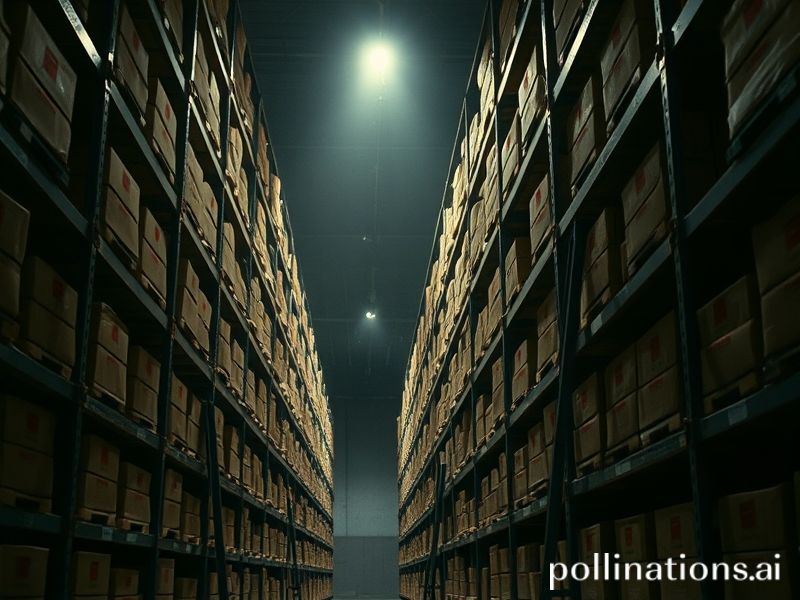Global Lockup: How the World Learned to Rent Empty Space and Call It Progress
GENEVA—Somewhere in the fluorescent bowels of the World Trade Organization, a delegate from Singapore is arguing with a delegate from Brazil about the precise tariff code for “climate-controlled self-storage units, modular, 2.5 m², not elsewhere specified.” The rest of the planet, meanwhile, keeps shoveling its past into corrugated metal boxes and pretending the future will have room service.
Storage is the only industry whose product is literally nothing. Air sandwiched between prefab walls, sold by the cubic metre on every continent except Antarctica—though give the penguins time; they already outsource their egg-sitting. From Dubai’s desert “storage cities” (air-conditioning included, camels extra) to Lagos’s floating warehouses anchored in murky lagoon water, humanity has achieved the miracle of paying rent to itself for the privilege of not throwing things away. The global self-storage market is projected to hit US $64 billion by 2027, or roughly the GDP of Slovenia, a country that at least manufactures cars and existential dread.
We are, of course, world-class hoarders. The average American rents 5.4 square metres of extra space; the Chinese, late to the clutter game, are sprinting to catch up with “community storage” apps that let you share a locker with seven strangers and one determined colony of cockroaches. Europeans prefer the term “archiving,” which sounds more Renaissance and less intervention-worthy. Meanwhile, Syrian refugees in Turkey store whatever’s left of home—photo albums, deed to a house that no longer exists—in padlocked garages where the keys are often thrown away. One man’s nostalgia is another man’s unpaid invoice.
The geopolitics of storage is where the comedy darkens. Data—those invisible socks of the 21st century—must also be stored. Ireland, a nation once famous for exporting people, now imports server farms, cooling the cloud with chilly Atlantic breezes and even chillier tax rates. Russia demands its citizens’ data be kept “on national territory,” presumably so it can be mislaid more efficiently. And when Amazon’s S3 cloud hiccuped in 2017, taking half the internet offline, the Pentagon’s backup plan was, essentially, to refresh the page. Civilization, backed up to a thumb drive someone left in a Brussels taxi.
Climate change, ever the opportunist, has opened a new sector: storing carbon instead of Christmas decorations. Norway’s Northern Lights project pipes CO₂ into undersea saline aquifers, a sort of geological sock drawer that theoretically won’t be opened until the next mass extinction. Australia is experimenting with injecting carbon into basalt, because if anything screams permanence, it’s rocks in a country that keeps voting against climate action. The cynical among us—hi there—note that the same governments subsidizing fossil fuels are now charging taxpayers to hide the evidence. Out of sight, out of accountability.
Back on the physical plane, the pandemic turned storage lockers into micro-distribution hubs for panic buyers who needed somewhere to house 400 rolls of toilet paper they’d never emotionally metabolize. Japanese “share closets” rent out designer handbags by the hour, a circular economy that lets Tokyoites pretend they’re not drowning in both debt and micro-plastics. In Venezuela, bodegas rent safe-deposit boxes not for jewels but for insulin, a literal life-saving shelf space guarded by armed teenagers. Nothing says late-stage capitalism quite like paying protection money to keep your hormones refrigerated.
And still the containers pile up: 43 million unused shipping boxes globally, many orphaned in ports from Los Angeles to Lagos, too cheap to send back empty yet too expensive to scrap. They sit like corrugated sarcophagi, stuffed with last year’s fast fashion or nothing at all, monuments to the moment we decided warehousing uncertainty was more profitable than facing it. Somewhere, that Singaporean delegate is still talking tariff lines, proving once again that the only thing we truly excel at storing is bureaucracy. The planet keeps shrinking; the rent keeps rising; the junk migrates from attic to locker to cloud to sea trench. We used to reach for the stars. Now we just need somewhere to put them between gigs.







